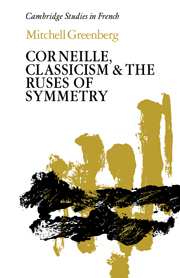Book contents
- Frontmatter
- Contents
- General editor's preface
- Preface
- Introduction
- 1 Mythifying matrix: Corneille's Médée and the birth of tragedy
- 2 Le Cid: Father/Time
- 3 Horace, Classicism and female trouble
- 4 Cinna: empty mirrors
- 5 Polyeucte: seeing is believing
- 6 Nicomède, Rodogune, Suréna: monsters, melancholy and the end of the ancien régime
- Notes
- Index
6 - Nicomède, Rodogune, Suréna: monsters, melancholy and the end of the ancien régime
Published online by Cambridge University Press: 25 October 2011
- Frontmatter
- Contents
- General editor's preface
- Preface
- Introduction
- 1 Mythifying matrix: Corneille's Médée and the birth of tragedy
- 2 Le Cid: Father/Time
- 3 Horace, Classicism and female trouble
- 4 Cinna: empty mirrors
- 5 Polyeucte: seeing is believing
- 6 Nicomède, Rodogune, Suréna: monsters, melancholy and the end of the ancien régime
- Notes
- Index
Summary
‘Un pas hors du devoir peut nous mener bien loin.’
With Polyeucte's epiphany Classicism is transformed into a vision of divine transcendence. This vision is both a mystery and, of course, a mystification. In Polyeucte sexuality and politics, individual desire and ‘raison d'Etat’ continue their spiraling ascension. In the culminating apotheosis they leave the realm of history, the frame which has enclosed all the great tragedies, and, breaking free of the mimetic bind, find their ultimate resolution in the silence and repose of the empyrean. In his most perfect tragedy Corneille presents the problematic that has defined the Classical subject with an acuity that effectively signals its end: Polyeucte closes the Classical universe upon its own transcendence. The polis of Cornelian dramaturgy is transformed into the Heavenly City of Absolutism. In this transcendence the essential predicates upon which Classical perfection rests are shown to be inconsistent with themselves. Their inconsistency is, nevertheless, obfuscated by the dazzling light of spiritual metamorphosis.
After Polyeucte something changes in Cornelian dramaturgy. Although Corneille's theatrical career lasted well into the century, never again does he create a tragedy of the overwhelming power and grace of the four canonical plays. The scope of this book does not allow an extended exploration of the greater part of the Cornelian opus. Nevertheless, I would like to offer, as a speculative conclusion, first some words on two plays – Nicomède and Rodogune – which strike me as particularly emblematic of the shift in the Cornelian world after Polyeucte and then on Suréna, Corneille's last tragedy.
Information
- Type
- Chapter
- Information
- Corneille, Classicism and the Ruses of Symmetry , pp. 146 - 165Publisher: Cambridge University PressPrint publication year: 1986
